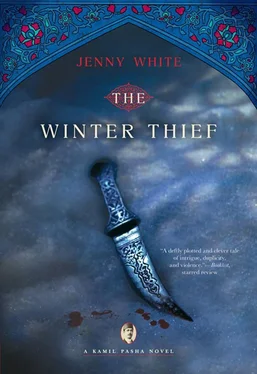Jenny White - The Winter Thief
Здесь есть возможность читать онлайн «Jenny White - The Winter Thief» весь текст электронной книги совершенно бесплатно (целиком полную версию без сокращений). В некоторых случаях можно слушать аудио, скачать через торрент в формате fb2 и присутствует краткое содержание. Жанр: Исторический детектив, на английском языке. Описание произведения, (предисловие) а так же отзывы посетителей доступны на портале библиотеки ЛибКат.
- Название:The Winter Thief
- Автор:
- Жанр:
- Год:неизвестен
- ISBN:нет данных
- Рейтинг книги:5 / 5. Голосов: 1
-
Избранное:Добавить в избранное
- Отзывы:
-
Ваша оценка:
- 100
- 1
- 2
- 3
- 4
- 5
The Winter Thief: краткое содержание, описание и аннотация
Предлагаем к чтению аннотацию, описание, краткое содержание или предисловие (зависит от того, что написал сам автор книги «The Winter Thief»). Если вы не нашли необходимую информацию о книге — напишите в комментариях, мы постараемся отыскать её.
The Winter Thief — читать онлайн бесплатно полную книгу (весь текст) целиком
Ниже представлен текст книги, разбитый по страницам. Система сохранения места последней прочитанной страницы, позволяет с удобством читать онлайн бесплатно книгу «The Winter Thief», без необходимости каждый раз заново искать на чём Вы остановились. Поставьте закладку, и сможете в любой момент перейти на страницу, на которой закончили чтение.
Интервал:
Закладка:
The street echoed with shouts and coughs, the moans of the wounded, the murmur of the crowd. A woman screamed, “My daughter, my daughter,” bucking against the bystanders who held her back from the burning building.
A burly, broad-shouldered man whom Vahid assumed to be the police chief was shouting at his men, “Keep the hell out of there, you idiots. It’s going to collapse and crush your stupid skulls. Where the hell is Rejep?”
Sure enough, there was a loud creaking and the taverna lurched as the second floor crashed down upon the first. The chief ran into the rubble, hauling and kicking planks out of his way, and pulled out one of his men. There was a cheer from the bystanders.
As he approached, Vahid noted with surprise that part of the stone facade of the bank also had collapsed. The explosion must have been there, with the fire spreading across the lane to the wooden taverna.
An explosion at the bank was sure to unsettle Sultan Abdul hamid. It was an attack on the financial center of the empire. As he surveyed the scene, Vahid began to see the destruction before him as a rare opportunity. As head of Akrep he commanded hundreds of agents and spies who would track down these criminals. Before long, they’d be hanging on a meat hook in Bekiraga Prison. Perhaps they were revolutionaries with bigger designs on the empire than a simple robbery. He could make sure they confessed to such a plot before they died. When Sultan Abdulhamid saw that Vahid had saved the empire, he was certain the padishah would appoint him chief of the Teshkilati Mahsusa, the enormous secret service that was now only in the planning stages.
As head of the Teshkilati Mahsusa, Vahid would command thousands, not hundreds, of men. They would infiltrate towns and cities all over Europe, not only the Ottoman Empire. He would have direct access to the sultan, instead of having to work through the vizier. The vast networks and resources would make him feared by even the highest-ranking men in the empire. There were those who didn’t believe him worthy of such an exalted position, men who would rejoice if he failed. But Vahid knew in his heart there was no one more capable than he, and he would prove it, possibly now with the help of this remarkable twist of fate.
The snow had let up, and he could see the corpses at the side of the road. At a distance they all looked alike, oozing black and red, mouths open in interrupted screams, claws instead of hands. The police were wrapping each body in a sheet. One man stopped to retch into the gutter.
Vahid walked over to examine the bodies more closely. The patrons of this taverna had been powerful men, but in death they were indistinguishable from those they had commanded.
He recognized her hair. Waist-length golden curls that turned in on themselves like a nautilus. He had never seen another woman with such hair. It had miraculously escaped the flames and unfurled across the pavement. He knelt and reached out to stroke it, avoiding looking at her body. When his hand touched the curls, his fingers stiffened, and for a moment he was unable to breathe, as if his own hands and lungs had been immolated in the fire. With great effort, he turned and inspected her face. It was Rhea. What an hour before had been a delicate face with an engaging smile and alabaster skin had become the bloated black and red mask before him. He remained motionless for a long while, then retrieved a silver hairpin set with rubies from her hair. When two policemen came to move the body, he stood and stepped away.
What was the woman he loved, the woman he was going to marry, doing at a taverna? Overcome by rage at the thought that she had been with another man, he squeezed his hand around the hairpin in his pocket, lacerating his palm. He would find this person and do to him what the man had done to Rhea.
As Vahid walked away from the scene, lost in thought, a man approached him. “Sir,” the Akrep agent said discreetly, “there’s been a new development.”
5
Vera took off her sodden coat and hung it over a chair, then dried her hair with a dirty underskirt. She opened the iron stove. Chunks of coal lay on top of kindling, ready for her to light. Silently thanking Gabriel, she wondered if he would come home tonight. She heard a commotion in the street. She peered out the grimy window, noting a strange brightness to the air, but could see nothing through the storm. After a few minutes, the sounds receded. Who knew what strange things happened at night in a city like this? Better to stay close to the fire and wait for Gabriel. She sat down next to the stove and examined her wool gown for signs of wear, fingering the embroidered sleeve that betrayed her family’s wealth.
She smoked a cigarette and threw the stub on the floor. Bored and hungry, she went to the cupboard and took out the remains of last night’s meal. If only Apollo had come to Istanbul with them as planned, she would have had company now. Her dear friend Apollo Grigorian, whose words poured like brilliant water over his listeners, soothing and inspiring them. He gave the revolution a charmed life, as if it had already happened in their minds and there was no longer any need to fret. Most of all, Vera remembered that he had held her hand when she felt homesick, and had healed her without saying a word. She knew that Apollo’s absence weighed on Gabriel, who had counted on his help for the project he was carrying out in Istanbul. With a stab of anxiety, she wondered whether something had befallen her friend, but then scolded herself. Messages were lost and carts overturned. She knew that Apollo would pick up the spilled apples and move on.
Vera wrapped herself in a quilt and sat back down beside the stove. She would go home to Moscow, she decided. Gabriel didn’t want her here, and she was a failure at being a socialist, a revolutionary, a wife, and, she added for good measure, a daughter. She smoked another cigarette and threw the butt into the stove, then lay down on the quilt. She kept the lamp turned low in case Gabriel should return. She thought about the beaded velvet gown her parents had given her last Christmas. She could almost feel the softness of it on her fingertips. Her baby sister, Tatiana, would be wearing it now. She remembered the weight of Tatiana’s heavy black hair in her hands as she plaited it and the smell of geraniums wintering on the windowsill.
She was asleep when Gabriel slipped through the door and shut it quickly behind him. Gabriel Arti was a tall man with slightly rounded shoulders and a pleasant, undistinguished face with a mustache and clipped beard. He pulled off his wool cap, releasing a shock of sandy hair, and tickled her cheek with it until she woke.
“Where were you this afternoon?” he asked, dropping his coat in the corner.
“I went to see that publisher.”
“God damn it.” Gabriel squatted down beside her, extending his hands to the fire. They were scraped and bleeding. “I told you not to go.”
She got up and went to a ceramic jar in the corner of the room. “Let me heat some water to wash your hands.” She dipped a copper bowl in the water and set it to heat on top of the stove.
“Well, did he agree? Was the fact that you put us in danger balanced by the publication of some tract that only five people will ever read?”
“I wasn’t followed,” she insisted. “It was snowing. Why are you being like this?”
“What difference would snow make, except to make it impossible for you to see whoever was following you?”
“That’s unfair. I have a mission too, and you have no right to keep me locked up here.” She lit another cigarette. “Where were you? You never tell me where you go. Why do I have to report to you?” She threw the cigarette to the floor.
Someone spoke in the street, a snatch of sound, then stopped suddenly. Gabriel rose to his feet so quickly he knocked the water from the stove. He put out the lamp and peered cautiously out the window. “Get your coat on.”
Читать дальшеИнтервал:
Закладка:
Похожие книги на «The Winter Thief»
Представляем Вашему вниманию похожие книги на «The Winter Thief» списком для выбора. Мы отобрали схожую по названию и смыслу литературу в надежде предоставить читателям больше вариантов отыскать новые, интересные, ещё непрочитанные произведения.
Обсуждение, отзывы о книге «The Winter Thief» и просто собственные мнения читателей. Оставьте ваши комментарии, напишите, что Вы думаете о произведении, его смысле или главных героях. Укажите что конкретно понравилось, а что нет, и почему Вы так считаете.












